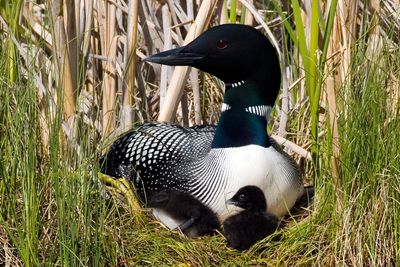Washington lags in loon protection

Loons are particularly vulnerable to death from ingesting even a single lead sinker.
Several states, including New Hampshire, Maine, Massachusetts, New York, Vermont and Virginia, plus 13 national wildlife refuges and Yellowstone Park, ban the use of lead sinkers in waters frequented by loons or swans.
Washington has not enacted recent proposals to restrict use of lead sinkers.
Instead, Washington Department of Fish and Wildlife officials say they are working with the Forest Service using signs and pamphlets that encourage anglers to use alternatives to lead sinkers at lakes such as Swan where loons are regularly found.
Although loon deaths from lead poisoning have been documented at Washington waters, the effect of the education campaign in reducing use of lead sinkers has not been measured, said Jim McGowan, Colville National Forest wildlife biologist.